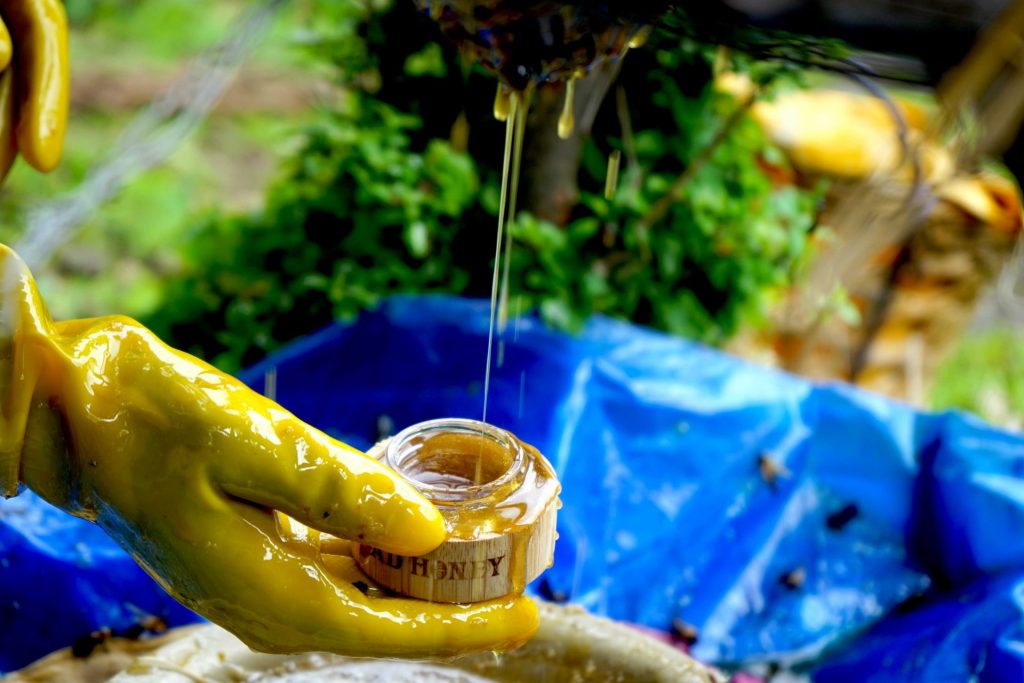
Nepalese hallucinogenic honey is special honey made from a rare species of rhododendrons. Bees that live on the mountainsides of Nepal feed on these flowers and produce a special type of honey, which looks and tastes different from the honey you know.
Hallucinogenic honey from Nepal is rare. It’s not as sweet as traditional honey is. It’s also more reddish in color. However, the biggest difference between this type of Nepalese honey and the regular variety is the effect hallucinogenic honey has on those who eat it.
When you eat small amounts of this honey, you can experience dizziness and euphoria. An excessive dose of mad honey can produce hallucinations. While some people value the mad honey experience, others face severe side effects including vomiting, loss of consciousness, and seizures. In some cases, hallucinogenic honey can lead to a fatal outcome.
Here are a few important things to know before eating Himalayan hallucinogenic honey.
The reason why mad honey in Nepal has a hallucinogenic effect is the toxins ingested by the bees that make it. When bees feed on the pollen of special types of rhododendrons that grow in the mountains of Nepal, they ingest grayanotoxins.
Grayanotoxins can have a substantial effect on your nervous system. While more studies need to be done on humans to identify the full effects of this toxin, animal studies revealed that even a small dosage can cause:
Exceeding the dosage can lead to worsening of the symptoms. That’s why it’s imperative to stick to what’s recommended by the manufacturer. Ideally, you should contact your doctor before trying mad honey for the first time. They can help you adjust the dosage and provide valuable recommendations.
While people have been eating the product created by hallucinogenic honey bees for centuries, there haven’t been enough studies on its effect. Since this type of honey is illegal in many countries, there is limited research.
However, there are certain contraindications to eating hallucinogenic honey. One of them is allergies. Any type of honey can cause allergies. The main allergen in honey is the pollen collected from the flowers.
If you are allergic to any food, you should be careful when trying to ingest mad honey. You may have an adverse reaction. Make sure to have allergy meds available.
Since hallucinogenic honey affects your nervous system, breathing, and heart, you should be very careful if you have:
If you have any chronic conditions, such as diabetes or asthma, mad honey can worsen the symptoms and even lead to a fatal outcome.
Mad honey shouldn’t be given to children.
Since mad honey can have an adverse effect on your health, manysome countries choose to ban it. For example, you can’t buy mad honey legally in South Korea, Mexico, and Australia.
Countries, where this type of honey is produced, sell it freely. So, you can easily purchase Himalayan hallucinogenic honey in Nepal or Turkey.
The United States doesn’t restrict mad honey sales. You can buy psychedelic honey online from anywhere in the country. However, you can’t use hallucinogenic honey if you are a minor.
If you aren’t sure whether mad honey is legal in your area, make sure to check the local laws. Since laws and regulations often change based on new research, it’s important to monitor these updates closely. Otherwise, you could face penalties.
If you are feeling the adverse effects of hallucinogenic honey, don’t hesitate to ask for professional medical assistance. Breathing problems and slow heart rate could lead to serious consequences.
In the emergency room, doctors are likely to treat you with 25 g to 100 g of activated charcoal. If you have serious bradycardia, you may need atropine or a cardiac pacemaker. Right now, the antidote for grayanotoxins doesn’t exist.
Don’t wait for the symptoms to get worse. Get help as soon as possible. If you are worried about the possible effect of honey on your nervous system, don’t eat it when you are alone. A friend or a family member can control the process and call 911 if necessary.
First accounts of the effects of hallucinogenic honey were recorded in 401 BC. Back then, eating this honey resulted in mass intoxication. A large group of soldiers that was traveling to Cyprus found numerous beehives and ate large amounts of honey. All of them experienced adverse effects.
Those who ate more honey felt a variety of side effects, such as vomiting and diarrhea. Those who didn’t eat too much reported hallucinations and intoxication. None of the soldiers were able to continue their journey until the next morning. Thankfully, none of them died.
Hallucinogenic honey has numerous properties, which some people believe to be therapeutic. Meanwhile, this substance causes euphoria. However, mad honey also comes with certain side effects. That’s why it’s important to set the right dosage, control the intake, and call for help when necessary.
Consult your doctor before trying mad honey if you have any chronic medical conditions, respiratory problems, or heart disease.